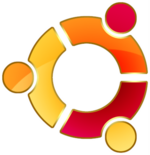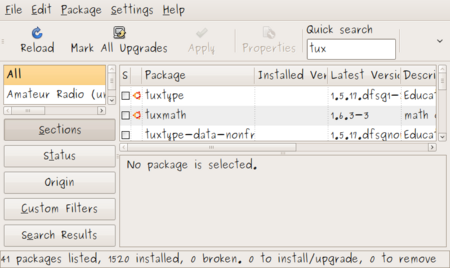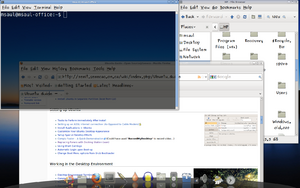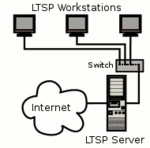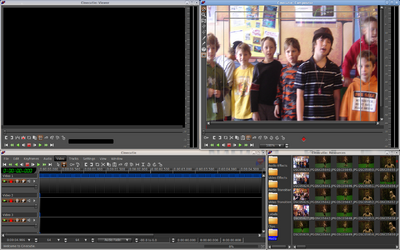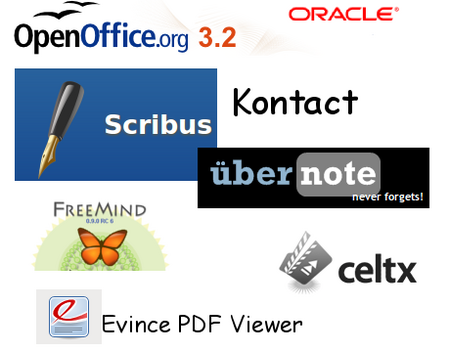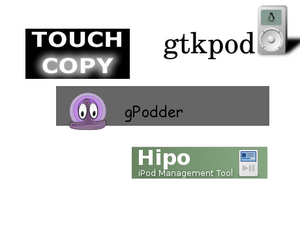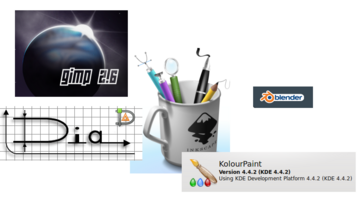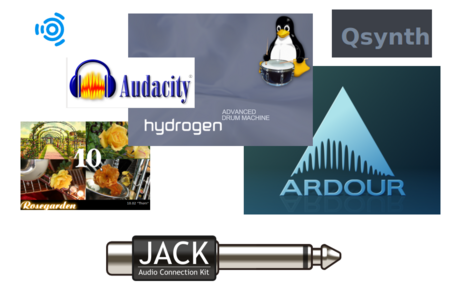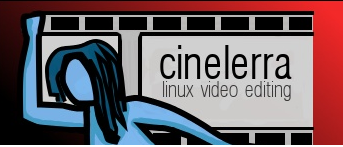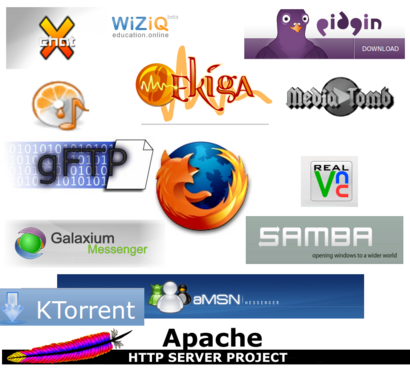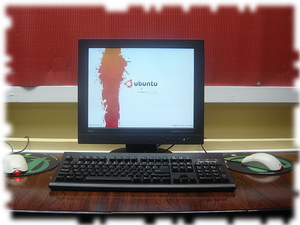Difference between revisions of "Ubuntu Guide"
| Line 340: | Line 340: | ||
:'''Using the WIKI to Document Church Projects:''' | :'''Using the WIKI to Document Church Projects:''' | ||
::* [[Documenting Church Projects]] | ::* [[Documenting Church Projects]] | ||
| + | ::* [[Video Planning]] | ||
:'''Strategies for Effective WIKI Collaboration:''' | :'''Strategies for Effective WIKI Collaboration:''' | ||
::* [[Planning]] | ::* [[Planning]] | ||
::* [[Conference]] | ::* [[Conference]] | ||
::* [[Volunteer Demo]] | ::* [[Volunteer Demo]] | ||
Revision as of 13:20, 19 June 2011
Contents
- 1 Your Ubuntu Linux "Guide on the Side"
- 1.1 Why Should I Use Linux?
- 1.2 Installing Ubuntu
- 1.3 Setting up Ubuntu
- 1.4 Working in the Desktop Environment
- 1.5 Setting up a Cost Effective Computer Lab (Edubuntu)
- 1.6 Setting up a Music Recording Studio (using Ubuntu Studio)
- 1.7 Setting up a Video Recording Studio (using Ubuntu Studio)
- 1.8 Using Ubuntu (Applications)
- 1.9 Application Links
- 1.10 Murray (Personal)
- 1.11 Westminster Links (Open Source / LTSP Project)
Your Ubuntu Linux "Guide on the Side"
This WIKI is a resource for people to learn how to work in the Open Source environment.
I would like to share from what I have learned when using Ubuntu Linux and have learned when using the Linux operating system over the past 12 years...
I intend to write full notes on how to use many of the applications listed below, but until then, I will provide links to documentation and list other resources such as tutorials and textbooks (if available) and possibly youtube videos for visual demonstrations...
Below are links to pages to provide useful help.
Why Should I Use Linux?
Installing Ubuntu
Setting up Ubuntu
- Tasks to Perform Immediately After Install
- Setting up an ADSL Internet connection (As Opposed to Cable Modem)
- Install Applications in Ubuntu
- Customize Your Ubuntu Desktop Appearance
- Setup Special Desktop Effects
- Compiz Fusion - A Quick Demonstration (Could have used "RecordMyDesktop" to record video...)
- Replacing Panels with Docking Station (awn)
- Using Short-Cut Keys
- Automatic Login upon Boot-up
- Change Boot Menu options from Grub Bootloader
Working in the Desktop Environment
Setting up a Cost Effective Computer Lab (Edubuntu)
Setting up a Music Recording Studio (using Ubuntu Studio)
- Purpose of this Resource
- Recording Studio Definition
- Considerations BEFORE Building a Recording Studio (Hardware)
- Example of Building a Recording Studio
- Installing Ubuntu Studio
- Quick & Simple - Setting up Jack Server and Q-synth
- Quick & Simple - Recording With Audacity
- Quick & Simple - Recording With Ardour
- Performing Live with Jack,Qsynth, and Bristol Organ
- How to Collaborate On-line
- Audio Engineering Online Course
Setting up a Video Recording Studio (using Ubuntu Studio)
- Purpose of this Video Editing Resource
- Video Studio Definition
- Considerations BEFORE Building a Video Studio (Hardware)
- Example of Building a Stop Motion Video Studio
- Quick & Simple - Using Cinelerra (Non Linear Editor)
- Advanced Editing Techniques - Cinelerra
- Definition of Stop Motion Photography
- Using Cheese / Cinecutie / Audacity to Create a Stop Motion Video
- Converting Video Files
- Recordmydesktop Utility
Using Ubuntu (Applications)
Office Suite | Productivity
- OpenOffice.org Writer (Word Processor)
- OpenOffice.org Calc (Spreadsheet)
- OpenOffice.org Impress (SlideShow)
- OpenOffice.org Draw (Draw Pictures)
- OpenOffice.org Base (DataBase Creation/Management)
- Scribus (Desktop Publishing)
- KompoZer (Webpage Publishing)
- UberNote (store & access notes anywhere - many features...)
- Evolution (Integrated mail, addressbook and calendaring)
- Tomboy (GNOME desktop note-taking application)
- Freemind (Mind Mapping)
- Crossover Linux (Run MS Office in Linux)
- Wine (Run Windows Applications in Linux)
- Celtx (Screen Writing, Story Line Development)
- Open Workbench (Open-source project scheduling
- GNUCash (Free Accounting Software)
- Taking Screen Captures
iPod / Hand-held / Podcasting
- gtkpod (upload songs and playlists to your iPod)
- ifuse (connect to iPhone and iPod Touch devices)
- gpodder (Subscribe to and automatically download podcasts)
- Hipo (iPod Management Tool)
- iPod-convenience (iPod Touch & iPhone sync setup)
- Barrybackup-gui (GUI for backing up the RIM BlackBerry Handheld)
- Gpe (G Palmtop Environment)
Graphics
Multimedia
Audio
- Ubuntu Studio (Real-Time Kernel plus bundled Audio/Visual Applications)
- Audacity (Audio Recording | Processing)
- Ardour (Replacement for ProTools - Powerful)
- Rosegarden (MIDI Multitrack Recorder)
- Hydrogen (MIDI Drum Machine)
- Freebirth (Bass Emulator)
- Freewheeling (Live Looping Instrument)
- Horgand (Organ Soft Sythesizer)
- Hexter (Yamaha DX7 Software Sythesizer)
- lmms (Linux Multimedia Studio)
- Festival (Text to Speech Synthesis)
- TuxGuitar (Write Guitar Tabs)
- aeolus (Pipe Organ Emulator)
- Bristol (Emulator for Moog, Prophet-5, Roland Juno-6, Yamaha DX-7,Hammond (single manual), Hammond B3 (dual manual))
- Jack Daemon (Low Latency Sound Server - Connect multiple appliations/emulators)
- Canorus (Graphical Music Score Editor with MIDI support)
Video
- CinelerraCV (Non Linear Video Editor - Community Version)
- Stopmotion (Stop Motion Photography)
- Devede (Media Transcoder)
- Gnome Baker (Burn CD/DVDs / Burn Images on CD/DVD)
- recordmydesktop (Capture Computer Session on video file)
- DVDstyler (DVD Authoring application for Video enthusiasts to create professional looking Video-DVDs)
- Miro TV (Watch internet TV - Streaming Video, etc)
Media Center
Gaming
- Cedega Gaming Service (Play PC games on Linux)
- Frozen Bubble (Like BubbleBobble Arcade game)
- Extreme Tux Racer (formerly Planet Penguin Racer, Tux Racer)
- Open Arena (First person Shooter - network)
- Alien Arena (First person Shooter - Alien Oriented - network)
- Nexiuz (First person Shooter - network)
- Sauerbraten (First person Shooter - network)
- Critical Mass (2D Space Shooter)
- Solar Wolf (2D Space Game)
- Chromium (2D Space Shooter)
- xmame (Classic Arcade Emulator)
- Aisleriot (Solitaire card game)
- Armagetronad (Tron Light Cycle)
- Neverball (3D Platform game)
- Pingus (Clone of Lemmings game)
- foobillard (3D Pool games)
- torcs (3D Driving Simulator)
- FretsonFire (Guitar Hero Clone)
- Freetennis (Tennis game)
- Lux Deluxe (Strategy game - Based on "Risk" board game)
Internet
- FireFox (Web Browser)
- Ekiga (Video Conferencing)
- Skype (Telephony)
- amessenger (MSN Messenger for Linux)
- galaxium (communicate using different networks at the same time - many protocols supported)
- Pidgin (Instant Messenger - many protocols supported)
- VNC Server / VNC Viewer (Remote Graphical Connection - Remote Control Software)
- Xchat-gnome (Text-based chats - IRC)
- gftp (Transfer File Between Computer Systems)
- apache2 (Web Server)
- ktorrent (BitTorrent download client)
- Samba (cross-platform file and printer sharing with Microsoft Windows, OS X, and other Unix systems)
- Mediatomb (stream your digital media through your home network and listen to/watch it on a variety of UPnP compatible device)
- Kradioripper (record internet radios and other streams)
- Sound-juicer (CD Ripper)
Education
Virtual Computing
Programming
- Programming Tools
- RCS (Revision Control System). RCS is useful for programs, documentation, graphics, etc. revised in a group/project environment.
Administration | System Tools
Application Links
Murray (Personal)
Westminster Links (Open Source / LTSP Project)
Seneca College (with the help of Murray Saul) created a Linux Computer Lab at Westminster United Church. Currently the computer lab uses LTSP (Linux Terminal Server Project) that connects workstations (fat clients) to a Linux server.The purpose of this project is to help Westminster develop a Linux lab support structure, and to become self-sufficient.
- Here are links that relate to this project:
- Using the WIKI to Document Church Projects:
- Strategies for Effective WIKI Collaboration:
